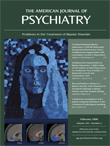Randomized, Placebo-Controlled Trial of Olanzapine as Maintenance Therapy in Patients With Bipolar I Disorder Responding to Acute Treatment With Olanzapine
Abstract
OBJECTIVE: In a placebo-controlled, double-blind study, the authors investigated the efficacy and safety of olanzapine as monotherapy in relapse prevention in bipolar I disorder. METHOD: Patients achieving symptomatic remission from a manic or mixed episode of bipolar I disorder (Young Mania Rating Scale [YMRS] total score ≤12 and 21-item Hamilton Depression Rating Scale [HAM-D] score ≤8) at two consecutive weekly visits following 6–12 weeks of open-label acute treatment with 5–20 mg/day of olanzapine were randomly assigned to double-blind maintenance treatment with olanzapine (N=225) or placebo (N=136) for up to 48 weeks. The primary measure of efficacy was time to symptomatic relapse into any mood episode (YMRS score ≥15, HAM-D score ≥15, or hospitalization). RESULTS: Time to symptomatic relapse into any mood episode was significantly longer among patients receiving olanzapine (a median of 174 days, compared with a median of 22 days in patients receiving placebo). Times to symptomatic relapse into manic, depressive, and mixed episodes were all significantly longer among patients receiving olanzapine than among patients receiving placebo. The relapse rate was significantly lower in the olanzapine group (46.7%) than in the placebo group (80.1%). During olanzapine treatment, the most common emergent event was weight gain; during the open-label phase, patients who received olanzapine gained a mean of 3.1 kg (SD=3.4). In double-blind treatment, placebo patients lost a mean of 2.0 kg (SD=4.4) and patients who continued to take olanzapine gained an additional 1.0 kg (SD=5.2). CONCLUSIONS: Compared to placebo, olanzapine delays relapse into subsequent mood episodes in bipolar I disorder patients who responded to open-label acute treatment with olanzapine for a manic or mixed episode.



